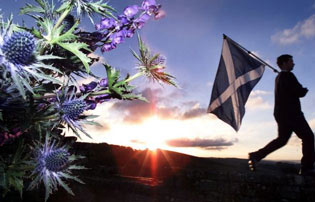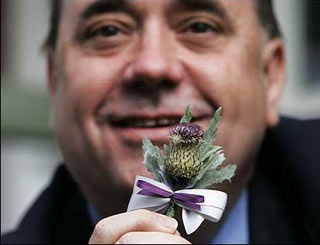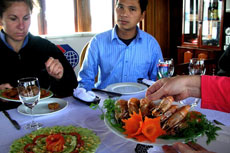Human Flower Project
Friday, May 04, 2007
Thistle Stop: Scottish Nationalists On the Rise
In yesterday’s vote, the Scottish National Party advanced and may force a vote on independence by 2010.

Scotland’s pro-independence movement is gaining,
spurred on by a traditional flower
Photo: Donald Macleod
Max Weber put his finger on it (Ouch!) when he described government as “the monopoly on violence.” Accordingly, any honest and ambitious political party looking for a floral emblem will choose a mean-ass plant.
No group has better “field position,” in this respect, than the Scottish National Party. The thistle, intractable, eight feet tall, and spiny enough to blow the cover (legend has it) of an invading Viking army, has been Scotland’s symbol for at least 600 years. As the loudest voice for Scotland’s independence, the SNP has “grasped the thistle” and vowed that, if it gains control of the Scotland’s Parliament, leadership will call for a vote on splitting free of the U.K. in the next three years. After three centuries of union, this prospect would solidify “dreams of an independent country matching the economic successes of neighbouring and similarly populated Ireland and Norway, rather than relying on heavy subsidies from London.”
Parliamentary elections were held yesterday, prognosticators saying Tony Blair’s Labour Party would be flushed from power. (Blair was born, by the way, in Edinburgh.) But the latest reports suggest the race in Scotland is much closer than expected. At the last count we picked up from the BBC, the SNP and Labour were tied, at 40 seats apiece in Scotland’s Parliament. Yesterday’s voting was described as “chaotic,” with some mix-up affecting 100,000 “spoilt ballot papers” (we sympathize).
 Alex Salmond, head of the Scottish National Party,
Alex Salmond, head of the Scottish National Party,
made a point with voters 5/3/07
Photo: David Moir, for Reuters
SNP leader Alex Salmond was out and about yesterday, electioneering by handing out thistles at the polls. We presume that Scotland’s florists have devised a way to make such boutonnieres bloodless, otherwise Salmond might have been doing his cause more harm than good.
There is, actually, some dispute over which thistle qualifies as Scotland’s true emblem. Our bit of research indicates that Onopordum acanthium is generally agreed upon, but because this plant isn’t native to Scotland, it seems a poor choice, despite is menacing appearance. Check here for more on the Scottish thistles, also known as Cluaran, Diogan, Foghnan, Giogan, Thrissel, and Tistle.
For some spiny human interchanges, read the comments on this recent editorial.
“Why oh why has the penny taken so long to drop? ” one writer asks.
“Labour, Tory and Liberal Democratic rule has done nothing for Scotland except to reinforce the status quo and to provide a nice profitable, comfortable way of life for a hell of a lot of political layabouts,” claims another. Poke those fat cats with a thistle!
Alastair says, “Wanting to ‘save’ the Union is, from a Scottish perspective, like some sucker for punishment wanting to ‘save’ a cancerous tumour. Good riddance! The sooner we’re shot of it the better. Good luck SNP, bye-bye “United” (sic) Kingdom!”
We’ll hope to update in the coming hours, letting you know how high the thistle stands. Note on 5/4: The Scottish National Party gained 22 seats—a total of 47—and the Labour Party lost 4, down to 46.
Under the current order, “Scotland’s parliament passes laws on education, health and justice and can alter income tax in Scotland by three pence in every pound, but London retains primacy on all matters relating to Britain as a whole, including defence, energy and foreign relations.” In other words, London holds the “monopoly on violence”—for now.




